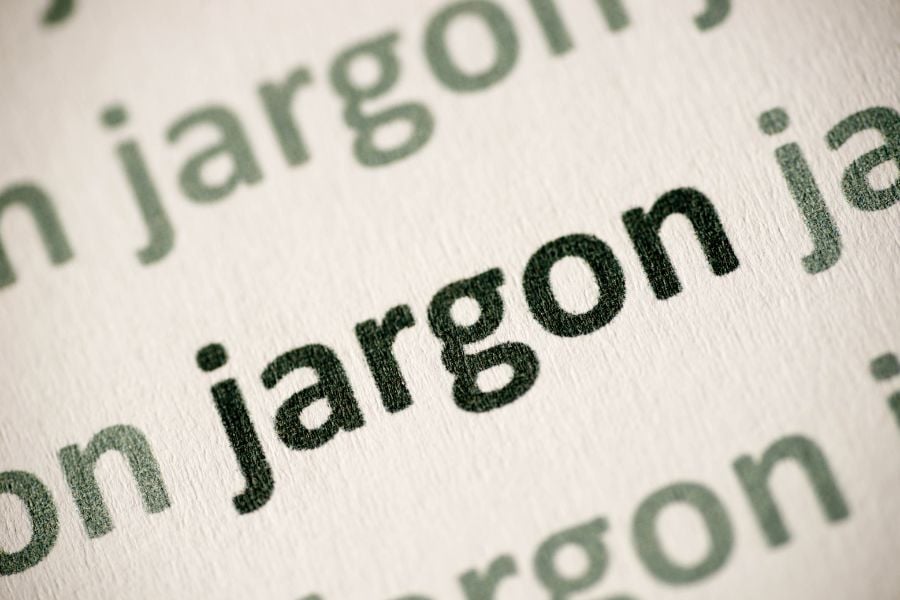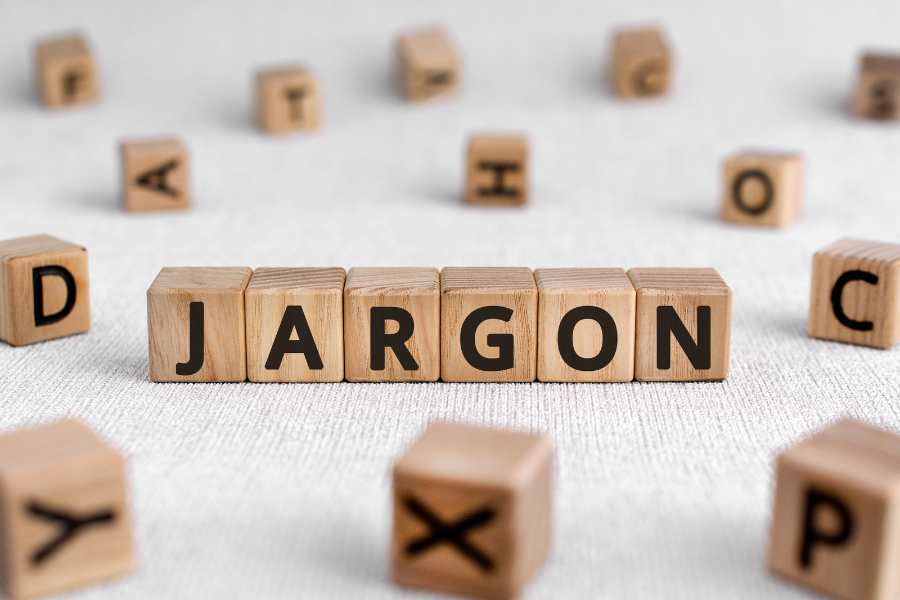Are you tired of feeling like you need a secret decoder ring just to understand jargon examples these days?
Don’t worry, you’re not alone.
As a writer, you know jargon is an important tool for clear communication. It quickly conveys complex ideas and concepts without long explanations.
But it can be confusing.
Well, whether you’re a technical writer, a copywriter, or a novelist, in this article you’re going to get examples of all kinds of jargon — the good, the bad, and the just plain ridiculous.
So, sit back and get ready to learn all about the literary device you never knew you needed.
Let’s dive in!

What Is Jargon?
The word “jargon” means the use of specific words and phrases in a particular field, profession or trade.
It makes it easy for people who know that special language to communicate, but most outsiders can’t follow it.
The English language teems with jargon words and phrases, whether it’s British slang (Don’t be such a melt about feeling knackered, cheers!) or some choice expressions in American English.
Sometimes people use jargon words to avoid harsh professional truths or to trick others who don’t understand the terms.
But most of the time, it’s just used for convenience, such as in technical jargon, business jargon or medical jargon.
But don’t confuse jargon with slang.
Jargon is specialized language. Slang is informal speech used in casual/social communication between friends or social peer groups.
100+ Great Jargon Examples That’ll Make You Smile

Below are some of the most ridiculous and obscure jargon examples we could find, with their literal meaning in plain English. (Try not to snort out loud.)
Slang, Street Language & Stale Buzzwords
Slang terms, street language, and stale buzzwords are often used in daily life.
Here are a few Gen-Z American slang words and jargon examples you may or may not recognize.
1. Boujee — Rich, luxurious, special, fancy, or extravagant.
2. Millennial Pause — The split-second millennials wait before talking in a video.
3. Basic — Boring or uncool.
4. Drinking the Kool-Aid — Too gullible or trusting of a situation.
5. Situationship — A relationship that’s almost romantic.
6. Rizz — Outgoing, charming person.
7. Touch grass — Told to someone who needs to get outside.
8. Main character — Self-indulgent or self-absorbed person.
9. Lit — Drunk or superb… or both.
10. Think outside the box — Be creative.
11. Cheugy — Out of style.
12. Hypebeast — Popularity hound.
13. Goblin mode — Behavior that disregards social norms or expectations.
14. Jacked — Really muscular.
15. Polycrisis — Old problems appearing in new ways.
Business Jargon a.k.a. Corporate Speak

Ahh, corporate jargon. If there ever was a language designed to obscure and belittle, this would be it.
16. I hope this helps! — Never ask me for anything again.
17. Sorry, I was on mute — I have absolutely no interest in this meeting.
18. Just circling back on this — I need an answer. A #@%*$! yes or no will do, just answer!
19. Thank you for your patience — You were anything but patient.
20. Prairie dogging — The simultaneous pop-up of several heads when something interesting happens around office cubicles.
21. Can I pick your brain? — Can I borrow some ideas? I have a presentation in a few minutes.
22. Bag of snakes — A business situation with lots of unforeseen problems.
23. Can I stir fry an idea in your think-wok? — Could I have your opinion on this issue?
24. Eat a reality sandwich — Said when someone’s ideas are completely unrelated to the current situation.
25. At the end of the day — I don’t care about the rest of this conversation except what’s coming after this sentence.
26. Sticking to our core competency — We’ve proven ourselves incompetent in other areas.
27. Take that off-line — Please shut up. You’ve embarrassed me in public. You’ll pay later in private.
28. Our lines were crossed — You didn’t listen and I’m right.
29. Blamestorming — What happens in a meeting where everyone is trying to assign blame for something.
Medical Jargon: Language Obscura

Medical jargon can be darkly humorous, pretentiously unintelligible, or just plain disgusting. Here are examples of all three.
30. Horripilation — Goosebumps.
31. Code Brown — A patient had a poop nightmare, and it’s everywhere.
32. Sphenopalatine Ganglioneuralgia — Brain freeze.
33. Google MD — A patient who looks up symptoms on the internet and corrects the doctor’s diagnosis.
34. Digging for Worms — Trying to find veins to stick a needle in.
35. Obdormition — When your limbs fall asleep.
36. Borborygmus — (Try saying that 10 times fast!) Stomach growling.
37. Cerumen — Ear wax.
38. Butts and Guts — Gastroenterologist.
39. Bloodsucker — Phlebotomist.
40. Lachrymation — Crying.
41. Rhinorrhea — A runny nose.
Law Enforcement Jargon or “Cop Shop Talk”

Here are a few phrases law enforcement officers use every day.
42. FIDO — F*** it, drive on.
43. Ride the Lightning — Tasering someone.
44. Blue Flamer — Rookie out to prove himself.
45. Vox — Violent intoxication.
46. Amateur Night — New Year’s Eve.
47. Christmastime — Flashing patrol car lights.
48. CODIS — Combined DNA Index System.
49. Deuce — Drunk driver.
50. Dine & Dash — Eating at a restaurant and running out on the check.
51. CUBO — Conduct unbecoming an officer.
52. Highballer — Motorist driving way too fast.
53. Badge Bunny — A police groupie who either dates officers, is obsessed by them, or both.
54. Ghetto Bird — Police helicopter.
Military Jargon – Caution: F-bombs Liberally Sprinkled

Military jargon can get complicated as each branch of the service has its own language, brimming with operational and technical terminology.
But like the United States Marines say: “Oorah!” Let’s do this!
55. PMS — Perfect military skills.
56. DISCO — Defense Industrial Security Clearance Office.
57. FNG — F***ing new guy.
58. Oxygen Thief — Recruit who talks way too much
59. Manpads — Man-Portable Air-Defense.
60. Soup Sandwich — A situation either poorly planned or gone terribly wrong.
61. FUBAR — F***ed up beyond all recognition.
62. Five-sided puzzle palace — The Pentagon.
63. Fugazi — Messed-up situation.
64. Jeep — Soldier just out of basic training.
65. POG — Person on ground.
66. BOHICA — Bend over, here it comes again.
67. Whiskey Tango Foxtrot — What the f***?
68. Voluntold — A voluntary action that isn’t actually voluntary.
Legal Profession Jargon – Legal Eagle-ese

I’ve always suspected that lawyers use all that Latin to make themselves sound smart. The problem is it also sounds ridiculous.
69. Quashal — Act of canceling or reversing something.
70. Aliquot — A portion of a larger whole such as a sample taken for analysis.
71. Excited utterance — A statement made in response to a startling or shocking event or condition.
72. Usurious — Charging illegal or exorbitant rates of interest.
73. Contemnor — A person found to be in contempt of court.
74. Laughing heir — Heir of an estate so remotely related to the deceased that they don’t know them and don’t grieve for them.
75. Livery of seisin — Transfer of possession.
76. Feoffment — Granting of a free inheritance of land to a man and his heirs. (English law)
77. Usufructuary — The right to use and benefit from a property, while it belongs to another person.
78. Jactitation — A false boast or claim that causes injury to another.
Social Media Jargon – Acronyms Assembled

Because of the limited length of posts and texts, social media is the most acronym/jargon-riddled communications medium in existence today. Check it out.
79. FOMO — Fear of missing out.
80. ICYMI — In case you missed it.
81. IRL — In real life.
82. BSAAW — Big smile and a wink.
83. FTW — For the win. Sometimes used sarcastically.
84. FUTAB — Feet up, take a break.
85. YOLO — You only live once.
86. “GMTA — Great minds think alike.
87. TL;DR — Too long; didn’t read.
88. GOAT — Greatest of all time.
89. IANAD — I am not a doctor.
90. LMAO — Laugh my ass off.
Jargon Used in Literature & Literary Jargon

Used in literature, jargon creates realistic situations according to setting, genre, and time period. But as a profession, writing also has its own specialized language.
91. Newspeak — A language designed to limit freedom of thought and expression by the totalitarian government in the book 1984 by George Orwell.
92. Doublethink — Holding and accepting two contradictory beliefs at the same time. 1984 by George Orwell.
93. Brobdingnagian — Something of immense size or scale. From Gulliver’s Travels by Jonathan Swift.
94. Bildungsroman — A coming-of-age story.
95. Magical realism — Genre that blends elements of magical or supernatural events with everyday reality.
96. Anachronism — Historical events, fashions, technology, etc., put in the wrong place and/or time.
97. Anthimeria — Most often means using a noun as a verb.
98. Doppelganger — Twin or double of a character, usually the “evil twin.”
99. Bathos — A sudden change in tone from serious to silly.
100. Motif — A recurring theme or idea represented through a symbol or image.
101. Verisimilitude — The appearance of being true or real.
Jargon Examples: The Literary Tool You Never Knew You Needed
Did you have fun wading through the morass of pretentious, ridiculous, condescending, secretive claptrap known as jargon?
No decoder ring needed, right?
So now that you know more jargon examples than you ever wanted to… you can use them.
That’s right. Savor every colorful slang word for its unique expression. Use these creative terms in your content marketing and other marketing efforts.
Use them to make your fiction more realistic, your copywriting more precise, and your professional writing more authoritative.
Remember, jargon is a tool. It’s positive or negative according to how you use it. (Just use it sparingly.)
GLHF. Good luck, have fun.
Now, get writing!
The post 100+ Colorful Jargon Examples from Business, Literature & More appeared first on Smart Blogger.

No comments:
Post a Comment